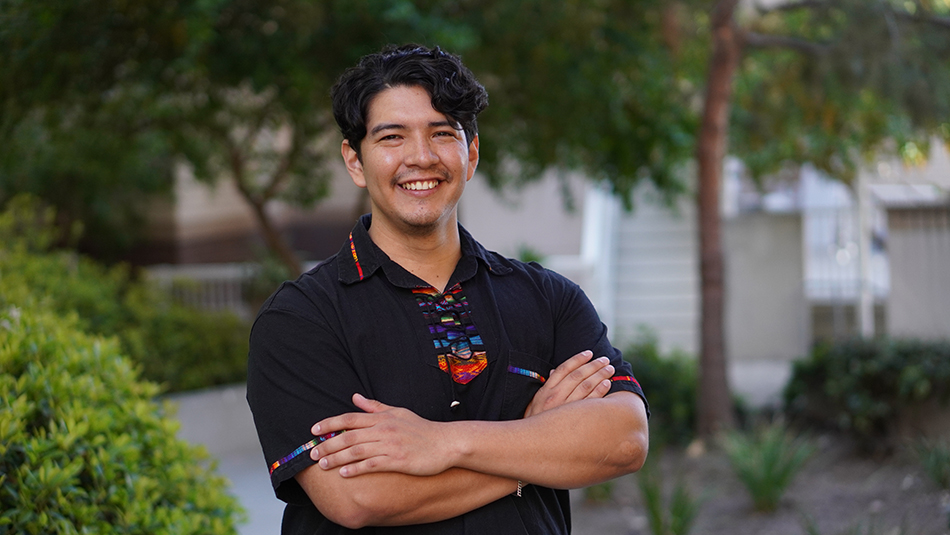
Carlo Chunga Pizarro awarded Ford Foundation Predoctoral Fellowship
Being undocumented himself, Carlo Chunga Pizarro understands being excluded from political and social systems. That’s why the Ph.D. student in urban and environmental planning and policy is focusing his study on mitigation practices in disaster planning.
“I want to highlight knowledge and engagement of undocumented communities,” says Pizarro, whose scholarly pursuit has landed him a Ford Foundation Predoctoral Fellowship, which comes with a total of $81,000 in stipends over the next three years. “Most literature has focused on post-disasters, with a focus on how communities have overcome horrors of disasters. I want my study to be more of a proactive, not reactive, approach to disaster planning. As a first-generation undocumented student, I have a personal connection to research that aims to influence public policy that improves the lives of undocumented communities in this country. Most importantly, I aim to inspire the next generation of social scientists by serving as a role model. I want to use my life experience to motivate students from marginalized backgrounds to seek higher education and demonstrate that it’s possible to advocate for environmental justice in this space through a reflection of their own experience.”
To that end, Pizarro’s dissertation research, titled “UndocuKnowledge: The inclusion and exclusion of undocumented communities in the disaster planning process,” will examine disasters and their disproportionate impact on communities of color, and undocumented individuals in the United States.
“This social disparity is linked to decades of exclusion of marginalized people from participation in social or political processes, such as disaster planning,” Pizarro explains. “Disaster planning is a process that identifies risks associated with hazards, strategies to minimize impacts of disasters, actions taken during an emergency to reduce casualties, and how to rebuild after a disaster. The exclusion of marginalized communities in disaster planning results in a limited capacity to recover from disasters. With the increase of aggressive hazards due to climate change, it is now more crucial than ever to identify inclusive approaches to disaster planning.”
While there has been an increase in the recognition of marginalized populations in disaster planning, undocumented status as a social disparity often is ignored, he adds.
Pizarro also will study policies in sanctuary cities and whether they grant undocumented immigrants access to disaster recovery assistance. “I seek to investigate the methods in which sanctuary cities include the needs of undocumented individuals before, during, and after a disaster. Ongoing research illustrates that policymakers need to develop a deeper understanding of immigrant community knowledge to develop inclusive disaster plans. With the recent adoption of the Hazard Mitigation Plans throughout sanctuary cities in Southern California, I will use an interpretive approach to investigate to what extent undocumented community members were engaged in the disaster planning process, and if the city upholds its sanctuary statement through policy and action. The principal goal is to understand how governmental processes include, engage with, work with the knowledge to prepare undocumented communities for natural hazards,” he says.
“Carlo has managed to identify a topic of both scholarly significance and policy urgency,” says Pizarro’s mentor Michael Méndez, assistant professor of urban planing and public policy. “I look forward to working with him as he pursues this research.”
Pizarro, who earned his Master of Urban Planning in 2021 and his B.S. in urban and regional planning in 2019 from Texas A&M University, expects to complete his Ph.D. in 2026.
His goal is to become a university professor who will partner with marginalized communities and advocate for environmental justice by developing a program focused on community-engaged disaster planning research.
Pizarro was born in Piura, Peru and raised in College Station, Texas. He is grateful for the support he received from Mendez, fellow student and Ford Fellow Rosie Sanchez and his family and friends for helping him land the Ford Fellowship and for “giving me the space to talk about my ideas and showing me comfort and love.”
Besides his Ford Fellowship, Pizarro is the recipient of a William Averette Anderson Fund Fellowship. Professional development fellowship that works towards expanding the number of historically underrepresented professionals in the field of hazard and disaster research and practice.
— Story by Mimi Ko Cruz / Photo by Christine Parales Porciuncula
Contact:
Mimi Ko Cruz
Director of Communications
949-824-1278